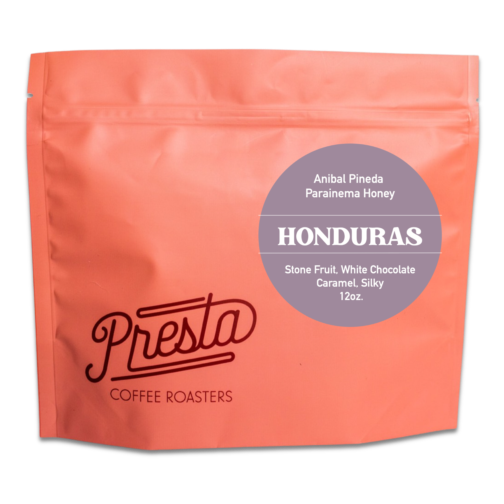
Honduras - Anibal Pineda - Honey
Origin: Honduras
Region: Santa Barbara
Farmer: Anibal Pineda
Farm Elevation: 1450 MASL
Processing Facility: At Farm
Varietal: Parainema
Processing Method: Honey
Tasting Notes: Stone Fruit, White Chocolate, Caramel, Silky
This coffee varietal is the result of human selection. Farmers pick specific coffee trees to continue growing at their farm, making decisions that have incredible impact on their future. They have to decide if they want to grow trees that produce the most coffee, or the best coffee, trees that grow well with less water, with general resilience to the changing climate, and trees that are resistant to diseases common in their region. This Parainema Hybrid varietal was selected by the Honduras Coffee Institute for its resistance to three of the major threats to coffee production; disease, pests, and drought: in addition to having an excellent taste profile.
Honey Processing is when the coffee cherries have their skin removed along with varying amounts of the fruit matter (or mucilage). The fruit that remains on the coffee seed (bean) changes, through enzymatic reactions and oxidation, encouraging the bean to develop different flavor compounds depending on how long the fruit matter is left on the seed. We usually classify the different amounts of time based on the color changes to the mucilage; white, yellow, red, or black. White, meaning the bean was exposed for the shortest amount of time before the mucilage is removed, and black meaning the bean was left until the mucilage had completely darkened, and often completely dried, before removal. The name Honey comes from the sticky quality that the fruit matter left on the bean has before it dries.
This is the third year we have purchased coffee from Anibal Pineda, and we are excited to bring it to you again. Intentionally selecting the coffee we bring in for our customers is direct feedback for the farmers, letting them know what is working, and what we find interesting at the roaster and consumer level. This years honey process has an exceptionally creamy body, light floral aromatics, and the sweetness of ripe stone fruit.
